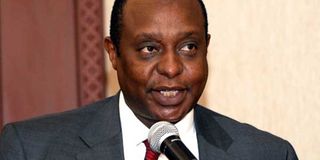Taxman seeks to widen net to plug revenue shortfall this year

National Treasury Cabinet Secretary Henry Rotich. The Kenya Revenue Authority will have to expand the tax net to increase revenue collection if it is to meet next year’s target. PHOTO/SALATON NJAU
What you need to know:
- Experts say there is great potential to increase revenue collection if the informal industry is included in the tax net. However, the taxman will have to improve the systems to capture entities which are currently outside its net besides sealing loopholes for evasion and under-declaration.
The Kenya Revenue Authority will have to expand the tax net to increase revenue collection if it is to meet next year’s target.
According to the budget estimates for 2014, the government expects to collect Sh1.180.5 trillion, an improvement from Sh973.5 billion that it expects to net by the end of June 2014.
National Treasury Cabinet secretary Henry Rotich said the government would enhance tax collection this year to meet the budget needs.
Key to increased tax collection is the automation of transactions at the KRA. The process to have all businesses provide tax declarations online — through iTax — by the end of March was delayed after the platform failed to cope with the huge data traffic. The taxman then opted for phased registration through iTax, depending on the turnover of businesses.
“Revenue collection efforts will be enhanced to ensure that all potential taxpayers make their contribution,” Mr Rotich said.
Experts say there is great potential to increase revenue collection if the informal industry is included in the tax net. However, the taxman will have to improve the systems to capture entities which are currently outside its net besides sealing loopholes for evasion and under-declaration.
“Kenya has a huge unbanked sector and KRA can still increase its revenue allocation by between Sh200 billion to Sh300 billion if it brought into the tax net more of the unbanked,” said the RSM Ashvir group chief executive, Mr Ashif Kassam, when he released banking sector performance 2013 survey last week.
KRA acknowledges that optimal revenue from some of the sectors is yet to be realised as tax declarations are mostly based on self-assessment, a method that is prone to under-declaration.
“There is great potential to increase tax revenue, particularly in the informal sector. Automated systems will introduce transparency in tax declarations. The widening of the tax net could lead to lower rates in the future,” said the commissioner for domestic taxes, Mr Pancrasius Nyagah
RSM Ashvir, an audit and tax advisory firm, said that while the bank deposit base was 51.3 per cent of national wealth estimated at Sh3.76 trillion, KRA is only able to collect 25 per cent of the amount, indicating the potential for higher tax yield from the “hidden” economy that is largely unbanked.
Mr Nyagah, however, said the tax collector could not disclose the figures that remain uncollected but added that projections were available based on trends in the country.
“Tax declarations are currently based on self-assessment and with our limited capacity to audit all businesses, we are not able to deal with under-declarations on time. The law, however, allows us to calculate tax seven years backwards when we audit, and where deliberate fraud is suspected, we can go back many years. That is the risk many Kenyans are taking,” he said.
Nevertheless, Mr Kassam said the performance of KRA in collecting 25 per cent of revenue to GDP is among the best both in Africa and globally.
Next year’s performance will be underpinned by ongoing reforms in tax and customs administration.





